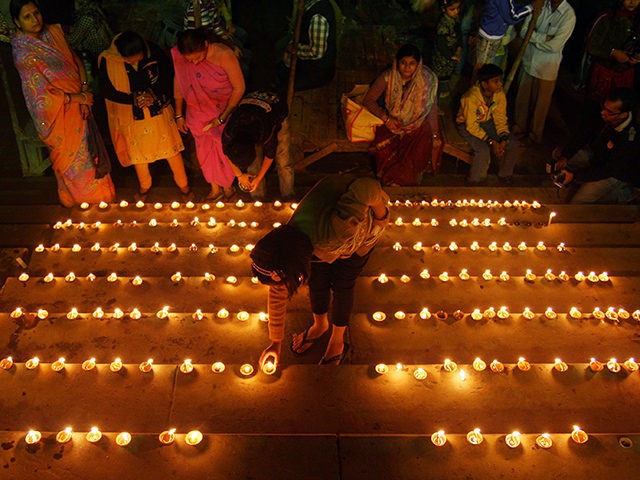A government advisory body in India recently launched a campaign to boycott Chinese-made plastic lights for the upcoming Hindu festival of Diwali in favor of domestically manufactured oil lamps made of cow dung.
The campaign is headed by Rashtriya Kamdhenu Aayog (RKA), an apex advisory body established by India’s Ministry of Fisheries, Animal Husbandry, and Dairying. RKA is run by Indian Prime Minister Narendra Modi’s Hindu nationalist ruling party, the right-wing Bharatiya Janata Party (BJP).
“The RKA hopes to produce some 330 million oil lamps, known as diyas, each of which will cost between 4 rupees and 20 rupees (US$0.05 to US$0.25),” the South China Morning Post (SCMP) reported on Monday.
Over 15 Indian states have agreed to participate in the boycott, including Uttar Pradesh and Madhya Pradesh, Gujarat, Kerala, and Tamil Nadu. The Uttar Pradesh city of Ayodhya expects to light an estimated 300,000 cow dung diyas, or earthen lamps filled with oil, for Diwali on November 14.
Diwali is India’s largest religious festival. Known as the Hindu festival of lights, Diwali symbolizes the spiritual victory of light over darkness, good over evil, and knowledge over ignorance. It is celebrated by India’s Hindus, who constitute nearly eight in ten people out of India’s population of 1.3 billion, as well as India’s Sikhs and Jains.
Cheap, LED lights made in China have flooded the Indian market in recent years. India imports an estimated 10 billion rupees ($134 million) worth of these lights from China and a handful of other countries each year. This means most Indians use plastic, Chinese-made lamps to celebrate Diwali. An Indian merchant told the SCMP that he sells “a packet of 15 electric Chinese-made diyas for about US$2.”
An ongoing border standoff between India and China along their disputed Himalayan boundary has led to increased economic tensions between the two nations over the past six months, including a general call across India to boycott Chinese products. New Delhi banned 177 Chinese-made apps this past summer and terminated various business contracts with Chinese companies.
The China boycott has been further strengthened by Indian Prime Minister Narendra Modi’s separate call in April for a more “Self-Reliant India.” Modi launched the initiative in response to the Chinese coronavirus pandemic, which he said had exposed India’s overreliance upon China for trade and manufacturing. The prime minister urged Indian businesses to focus on developing domestic supply chains in an effort to become more independent.
New Delhi’s latest anti-China campaign encouraging Indians to produce Diwali lamps out of cow dung has been met with enthusiasm, in part due to the vast abundance of the material in the country. According to the SCMP, India produces nearly two billion kilograms of cow dung a day. Sellers of the cow dung lamps have marketed the items as a healthier, eco-friendly alternative to the Chinese versions, which some allege are made from cheap plastic that may contain toxins.
Diyas in India were traditionally made from earthenware by small-scale artisans for centuries before the onslaught of cheap Chinese products saturated India’s market in recent years, making the handmade lamps less popular. Hindus consider the cow to be a sacred animal and its dung is likewise considered pure, used in ritualistic ceremonies to symbolically cleanse.
China’s state-run Global Times on November 5 commented on the Indian government’s campaign to replace Chinese-made lights with domestically produced diyas for Diwali this year.
“Some may be willing to buy Indian-made products at a much higher price to show their support to their country’s manufacturing sector, while others who cannot afford too much on the festival are expected to have a bad consumer experience with some stinky lights,” the newspaper claimed, falsely implying that the cow dung diyas are more expensive than the Chinese-made versions.

COMMENTS
Please let us know if you're having issues with commenting.